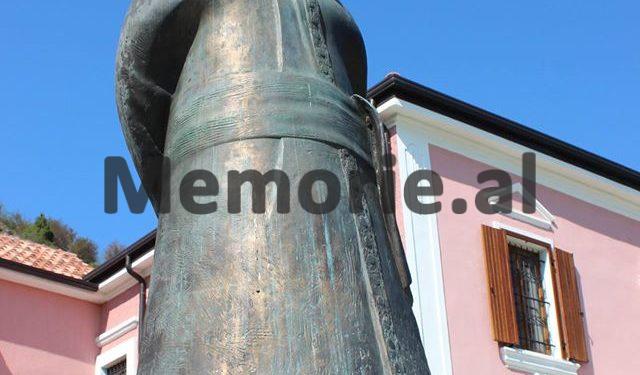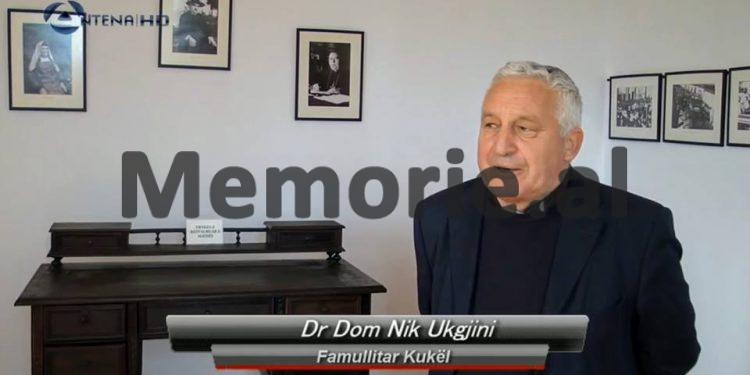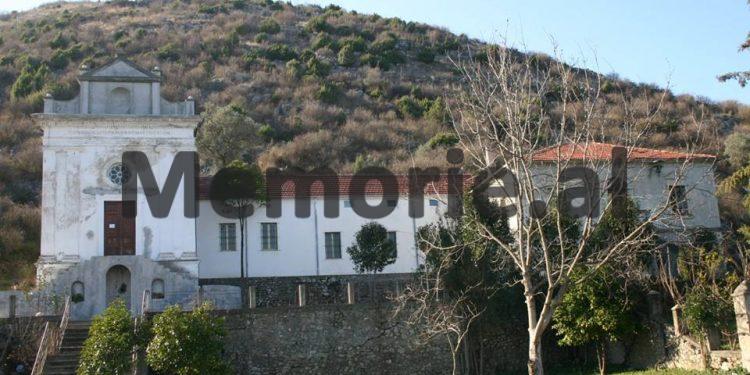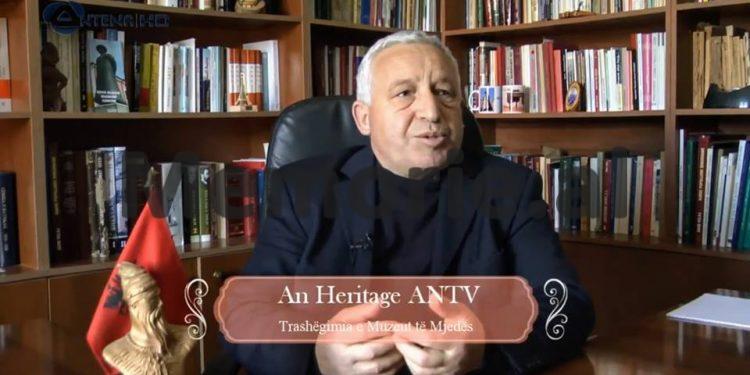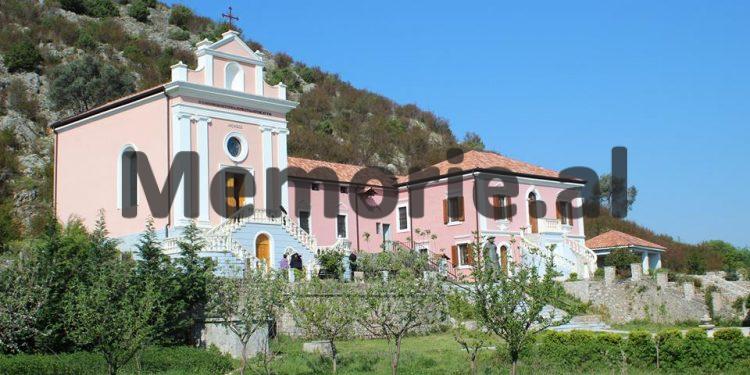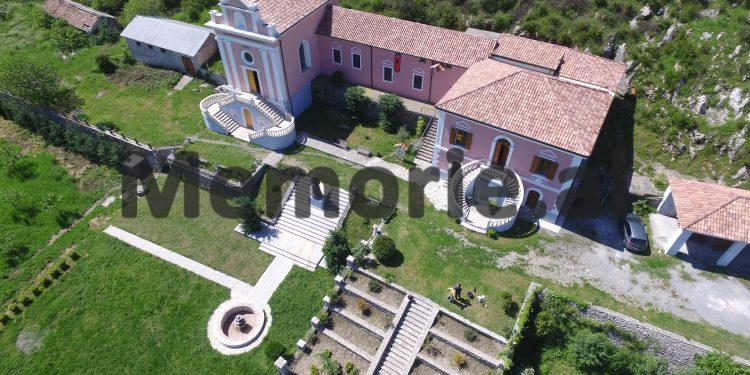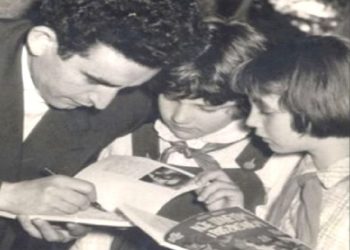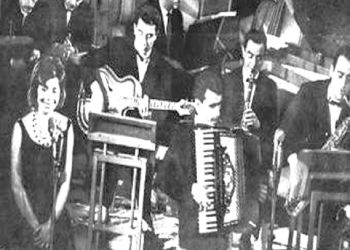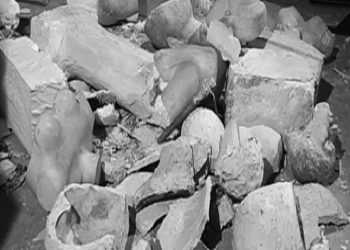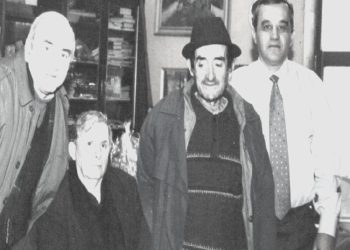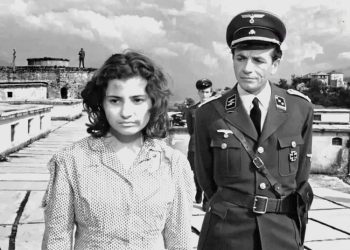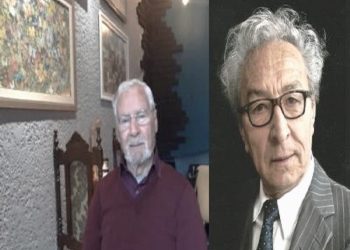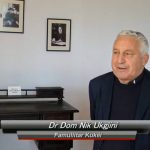
By Dr. Dom Nikë Ukgjini
Mjeda and his connection with Kukli
Memorie.al/Ndre Mjeda as a polyhedral figure, has aroused a significant interest in young scholars to know the work and life of the prominent Albanian poet and linguist who devotes his entire life to our national cause. While we have a considerable interest in environmental studies, there is also a tendency to re-read Mjeda’s work, because also because this author worked both for his century and for the times to come. The centers of albanological studies, university departments as well as pedagogical and scientific institutions throughout Albania have given an impetus to these conditions.
Based on these facts, the parish priest of Kukli Dom Nikë Ukgjini, with his arrival in 2006, has been working for several years in a row for the return to the identity of the construction world of St. Stephen’s Church as well as the apartment (cell) designed by the hand of the poet and where he had spent 30 years until his passing into eternity on 1 August 1937.
Mjeda came to the parish of Kukli in 1906, from the parish of Dajç of Zadrima and his work was focused on building the house, built in 1906 and a room converted into a Church which by expanding in 1913 gave the form of right.
Mjeda, in order not to let a village with inhabitants disappear, gave a big boost to the development of agriculture and livestock in the village and the area of Zadrima in general. He thus worked for thirty years to transform Kukli, to create the model of a modern village, of an advanced economy, which, then, to spread through it his ideas for the transformation of the whole country.
Kukli, as a center – because in terms of population has always been small and negligible – was known through Mjeda by many international personalities. Thus, the Austrian, Paul Siebertz, in his book, Albanie und Albanofen, testifies as an eyewitness, that in 1909, Kukli had 27 families, while Franz Seiner, in the statistics made for the population in Albania during the years 1916-1918 notes that Kukli and Mali i Kuklit, had 45 houses, of which 39 were permanently inhabited; had 302 inhabitants and 12 of its inhabitants were of the Muslim faith. Similar notes about the number of inhabitants can be found in Father Lorenc Viezzoli, S.J, in 1923, where Kukli, turns out to have 302 inhabitants.
Regarding Kukli, Mjeda also had bitter moments, two arrests: in 1912, he was arrested by the Ottoman officers of Ali Fehmiu Kosturi and kept locked in Kukli’s cell, where many manuscripts of his many years of work were burned and in 1916, by the Montenegrin army fleeing from Mirdita, they in Kukël were released as enraged against the parish priest Mjeda, arresting him with the aim of eliminating him. This, fortunately, ended with this, because the Serbian and Montenegrin armies withdrew in early 1916, followed by the Austro-Hungarian army.
From the parish of Kukli, Mjeda, performs the duty of deputy, politician, diplomat. At the same table that is in the museum today, he wrote and rewrote his creative and translation works, drafted hundreds of pages of textbooks and wrote dozens of study pages, etc.
The parishioners who came later, such as: Karlo Prenushi, Zef Gila and Ernest Troshani, who on the eve of Christmas 1963, was arrested by the communist regime, as a sign of respect for their teacher, Ndre Mjedë and Albanian culture , took care of the preservation of the poet’s premises and relics that were in the house (cell), such as: a part of the library with some manuscripts, tables, pens, typewriters, a wooden cross, damaged by Ottoman invaders, which Mjeda kept on his desk, etc.
The museum house in the time of communism
With the official closure of religious sites in Albania in 1967, which was inspired by the Chinese Cultural Revolution, the exile, imprisonment and shooting of Catholic clergy will continue with even greater intensity, adding to these the destruction and alienation of church buildings. .
The facilities in Kukël in 1967 were alienated: the church was turned into a collection depot and later a military depot, while the parish house became a residential house for the residents and a room in 1962 and later in 1982, a museum was set up with some relics of Mjeda. .
After the democratization of Albania in 1991, it was found that both objects of neoclassical style were severely damaged. The room-museum was closed and the objects, along with the work table, were sent for safekeeping to the Historical Museum of Shkodra.
Recreation and completion of the Center “Ndre Mjeda”
With the arrival of Mother Teresa’s brothers in this parish, in 1991, action was taken for the temporary restoration of the facilities in question. So in 2007 I started drafting a plan for organizing a complete and essential intervention for the restoration of facilities and re-arrangement of the premises of this religious and cultural center.
The ideas put on paper for the rehabilitation and completion of the Center with the relevant facilities, for the return to the identity of the Center and its completion, began on March 19, 2011 with intervention for the rehabilitation of the Church building, which was in a more urgent state due to damage. suffered. The works of the phase were closed, together with the courtyard and the erection of the magnificent statue of the poet Mjeda, at the end of July, taking place the inauguration ceremony on August 1, 2012, the day of the death of the poet Mjeda.
With the collection of funds from the European Community, in May 2014, the works of the second phase continued, which included the complete restoration of the museum house, and in September-October of the same year, the works on the museum system on the first floor were completed. first and second. The final moment of all works was dt. 18. November 2014, when in the presence of high ecclesiastical and state authorities of culture, the inauguration ceremony of this important nationwide Center took place.
With the completion of these works, the idea of a complete restoration of the identity of the Church and the house of Mjeda and the Center “Ndre Mjeda” was fully realized, was put in full service of Albanian and foreign culture.
It should be noted that in the center of attention of this Center, announced on December 16, 2011 Cultural Monument, is the original 100-year-old table of the poet Mjeda.
The museum which is located inside the building of the Center “Ndre Mjeda”, due to its values, the Ministry of Culture dated. 16. November 2015, has been declared a National Private Museum.
The center takes on nationwide proportions
“Days of the Environment” 2011-2013
During the development of works in the Museum Center “Ndre Mjeda”, this Center with director Dom Nikë Ukgjini, at the same time, had taken over the role of promoter and supporter for organizing scientific conferences of environmental studies and continuous commemorative meetings “Days of the Environment” . For this he has approached a group of devout scholars, who engaged in scientific research about the work and life of Mjeda. The result of these efforts is the organization of commemorative activities dedicated to Ndre Mjeda, which has increased the interest of institutions for this bright figure of the National Renaissance. This has brought to these scientific-commemorative activities prominent figures of Albanian science, but also many talented young researchers.
The idea of holding cultural meetings “Day of the Environment”, which commemorates the birth on November 20, 1866, and the death of the poet on August 1, 1937, were implemented by scholars: Stefan Capaliku, Dom Nikë Ukgjini, Mentor Quku, and Zef Paci, on the day commemorative of the poet’s death, on August 1, 2011, organized by the Ndre Mjeda Foundation and the Municipality of Bushat and the Center for Albanological Studies in Tirana. In this meeting where participated also state figures, such as: Speaker of Parliament, Jozefina Topalli; Deputy Minister of Education Nora Malaj, and foreign diplomats, in addition to the cultural program, started the award ceremony, “Ndre Mjeda” – bronze medal which was handed over to the environmentalist Mr. Mentor Quku, as well as diplomas for the best reciters, which were presented to the winners by Nora Malaj and Ardian Marashi respectively. On the birthday of Mjeda, on November 20 of the same year (2011), the Municipality of Bushat, organized a cultural meeting with school children, which was attended by the Minister of Culture, Aldo Bumçi and other local public figures.
“Days of Mjeda”, due to the importance of the multidimensional figure of Mjeda, the holiday did not remain closed within the political borders of Albania, but took on national proportions.
As a good day of a new beginning of national meetings, was August 1, 2012, when in Bushat was organized by the three above mentioned subjects, the Scientific Conference on Mjeda, with the participation of 14 scholars from Shkodra, Tirana, Prishtina, Skopje and Tetovo. Well-known scholars for a full morning, the latest achievements in the field of study are revealed for the cleric, poet, linguist Ndre Mjeda. In the afternoon of the same day, in the Museum Center in Kukël, was held the folklore concert with the participation of singers from Albania and Kosovo. The Ndre Mjeda Prize this year was awarded to the well-known sculptor who realized the statue of Mjeda, Mr. Sadik Spahija from Tirana, and the Letter of Praise, was given to the architect, Zef Çuni who had designed the restoration work of the Church long damaged during the communist system. For the work done in the reconstruction of the Center, Dom Nikë Ukgjini who was declared “Honorary Citizen” of the Municipality of Bushat. Also on November 20, 2012, there was a cultural program with the participation of Monsignor Angelo Massafra, MP of the area, local authority and the Ambassador of Great Britain in Tirana, Mr. Nicholas Cannon.
Jubilee years
The jubilee year, the 100th anniversary of the construction of the Church, realized by the poet Mjeda in 1913, had various activities organized by the Center for Albanological Studies and the Museum Center Ndre Mjeda and the Municipality of Bushat.
On April 7, 2013, the spiritual Mass for Ndre Mjeda was celebrated, led by Dom Anton Kçira from Detroit. After the mass, lectures were held on the theological activity of Mjeda. Present were, in addition to local authorities, also, deputy. Minister of Culture Abaz Hado and Deputy. Minister of Education, Nora Malaj and other guests from America.
On May 11 of this year, the promotion of 10 volumes of the serial monograph Mjeda by Mentor Quku was held in the Church premises. In this promotion, seven researchers from the Albanological Center and the University of Shkodra spoke. Local government and state authorities were present. Mentor Quku’s tireless work for Mjeda has been assessed as colossal, because it has acquainted readers with areas unknown to date, with which the poet Mjeda has dealt.
Mjedë Days, on August 1, a Nationwide Folklore Meeting was conceived. It was attended by representatives from the Albanian territories: from Albania, Kosovo and Montenegro. At the end of the folklore meeting, the chairman of the jury, Prof. Aferdita Onuzi, announced the winners, the first place was won by the ensemble Trepça from Mitrovica. The fourth edition, Mjedë Days in Kukël, was organized on November 23, 2013. In this commemorative birthday meeting, which was held at the Church, participated, in addition to the organizers and vice. the Minister of Culture, Zef Çuni as well as his counterpart from Kosovo, Gjergj Dedaj, the OSCE Ambassador, Florian Raunig, etc.
The program opened with recitations of Mjeda poems, by actors of the Migjeni Theater, songs with lyrics by Mjeda, sung by the polyphonic choir, Preng Jakova, singer-songwriter from Zagreb, Bernadina Mjeda and the famous soprano, Ledi Paparisto. After that, the annual literary award was awarded, the bronze medal Ndre Mjeda for the researcher from Stubla (Kosovo) Isak Ahmeti.
Jubilee year, brought something special exactly on the commemorative day of the birth of Mjeda. The 100-year-old table of the poet Mjeda, after 23 years of destruction in the museum of Shkodra and many administrative vicissitudes was brought for restoration in IMK, Tirana, and on November 23, 2013, returned to the museum house where he had stayed for 30 years. This was achieved thanks to the many efforts from 2011 onwards, of Dom Nikë Ukgjini, and finally with the support of the Ministry of Culture, Visar Zhit and later Mirela Kumbaro.
Activities 2014-2016
“Days of the Environment” with nationwide involvement, have continued to be held in 2014 and 2015. On August 1, 2014, “Nationwide Folklore Meetings” with the participation of well-known rhapsodists from Kosovo and Albania and coinciding with the arrival of the Pope Francesco in Albania and on the date of Mjeda’s birth, dt. November 20, the same year, was organized the meeting (held November 23, as the most convenient day) “Poets for the Poet”, where 35 most famous poets and writers from Kosovo, Albania and Macedonia, revealed their poems for the poet Ndre Mjeda and some of them lectured on the creativity of Ndre Mjeda. In the same year (2014) in April, the Museum Center “Ndre Mjeda” and the “Institute of Albanological Studies” published the first volume of the magazine “Mjedology” where the papers of the two previously held Scientific Conferences on Mjeda and volume 2 in 2015 which contains the history of the parish of Kukli from the century. XV to date.
Also, 2015 was a prosperous year for us, because in addition to the usual meetings on August 1, we marked the birthday of the poet Mjeda on November 20 by inviting prominent scholars and poets from Albania and Kosovo who unveiled their literary creations and gave appreciation for the creative activity of the poet Mjeda. In the same year, apart from the publication of the magazine, Mjedologija 2, a documentary film was made about the construction history of the Museum Center “Ndre Mjeda”.
In 2016, the Center had the honor to welcome on August 21, a group of participants of the International Seminar, held in Pristina, from dt. 15 – 26 August 2016.
The Museum Center has been constantly in the attention of many visitors, from primary and secondary school students, from Shkodra and Tirana, to various visits of painters, sculptors, film actors, scholars, foreign and domestic diplomats. The centers have been constantly in the focus of the national visual media and print media in Albania and Kosovo. The center has become an object of study for many students from state and private universities from Shkodra and Tirana.
Kukli, where the poet spent most of his life, from a neglected country, has now turned into a modern country and a hotbed of national cultural significance. Although the poet Mjeda still does not have a tomb, the establishment of this Center is a cry for the structures related to culture, science, education, to be as conscious as possible in the spread of this great figure who honors us before the civilized world./Memorie.al
Kukel- Shkodër




